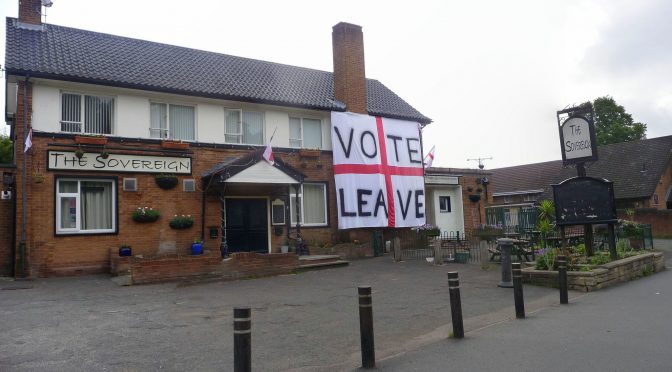By Leah Feder
Brits, Europeans and the world at large have experienced a rude awakening over the past 24 hours. The people of the United Kingdom have, against most predictions, voted to leave the European Union — inviting an onslaught of as-yet unknown consequences.
Lots of factors conspired to bring the country to this unexpected place: xenophobia, falling wages, a crumbling National Health System, fear of terrorism. Many causes lie at the origin of these fears and grievances, including decades of neoliberal policies, climate instability and a growing wave of right-wing nationalism that has taken hold both across Europe and here in the United States.
That the predictions about this vote were so off-base can be attributed to a country that is starkly divided along geographic and generational lines. Those in control of the media narrative, the intellectual and political elites — these are not the people who came out to vote “leave” yesterday. In fact, it would seem as if the two camps can barely understand one another’s existence — let alone hear what each other has to say.
Evidence suggests that the overwhelming preponderance of “leave” votes came from rural citizens over 50, while young Brits sought to stay in the EU. Perhaps that’s because young voters see a longer future for themselves playing out — one in which job flexibility, freedom of mobility, and enduring international stability will be increasingly relevant.
Those experiencing the so-called threat of migrant labor and an overstrained social welfare system don’t see themselves as potential beneficiaries of an expanded job market and diversified social services. Instead, they’re operating from a protectionist perspective, seeking to defend themselves against a world that they see getting rich at the expense of British labor and resources.
It may be easy to pin the causes of the Brexit on hate and xenophobia. But it’s important to note that the right-wing rhetoric that undergirds and spreads this intolerance only flourishes because its targets don’t see themselves as beneficiaries of the internationalism they’re rejecting. They aren’t mobile; they aren’t educated. Why should they concern themselves with the right to work abroad? Or trade? Or the research funding that further expands the gulf between them and the elites? Their conditions are worsening, and they’re looking for easy targets — which the right has been all-too-happy to provide in the form of international elites and, more importantly, immigrants.
Their conclusions may be wrong, but the symptoms they’re experiencing are very real — in particular, stagnant or even falling wages in many rural areas. The lessons for the United States are clear: if the left does not effectively provide an anchor-point for disenfranchised, disaffected masses, if we continue to see the white working class as beyond reproach — because they’re culturally unaligned with us, because we don’t tolerate their “backwardness” — we abandon those masses to a right wing that will eagerly embrace and lead them.
The leading force behind the Brexit was the right-wing UK Independence Party (UKIP), followed by “Vote Leave,” a cross-party alliance of Conservatives and representatives from Labor, UKIP and Northern Ireland’s DUP. UKIP came to prominence as a single-issue party with a digestible platform and an easy solution to all that ailed disaffected rural Brits: get out of the UK, and in doing so control the wave of immigration responsible for declining conditions in the countryside.
UKIP wants to see work visa restrictions imposed on European workers seeking employment in the United Kingdom. If the UKIP is successful in pushing this forward, British citizens working around the European Union are likely to face reciprocal restrictions in kind. This could have significant consequences for young British workers seeking employment around the continent.
By blaming falling wages and a shrinking job market on foreign workers, the right has misled workers in potentially harmful ways. In fact, as some argued in the lead up to the vote, the Brexit runs the risk of causing a severe rollback of workers rights — not just for EU citizens working in the UK, but for British nationals as well. After all, it’s largely EU regulation that has forced employers to offer contract and part-time workers the same basic conditions as full-time employees; that has led to the existing paid child leave; that has barred workplace discrimination. Outside of the EU, these rights are no longer secured. This could jeopardize the working conditions of many of the same people who voted in favor of the Brexit.
Brits have been left to live with the consequences of their vote. Already, some voters have found themselves vocally and publicly regretting the “leave” votes they cast just yesterday — whether because they were simply lodging a protest vote that they assumed wouldn’t matter, or, perhaps more commonly, because they now feel misled by the Vote Leave campaign, members of which are already starting to backpedal on their promises. (Google searches in the UK today suggest that a not-insignificant number of Brits might not have even been clear on what, exactly, they were voting on.)
Here in the United States, the parallels to our own looming election — and the prospect that it might be time to start imagining the unimaginable — are hard to ignore. If, in defiance of conventional wisdom, policy logic and the lessons of history, voters in the United Kingdom have voted for a shift led by right-wing xenophobic demagogues, might the same fate be possible here in the United States?
As many critics have so deftly observed, the polls in the UK made clear that Brexit was a very real possibility. Despite that, prediction markets and political pundits failed to take the prospect seriously; we’re living, it seems, in unimaginable times. As we face down the possibility of Donald Trump, our own homegrown demagogue, let this be a lesson: a general sense that a political outcome shouldn’t happen isn’t enough to ensure that it won’t.



